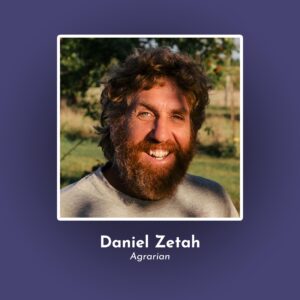
Show Summary
On this episode, Nate is joined by Daniel Zetah, who practices regenerative agriculture on his family farm in Minnesota. Daniel shares his experiences in becoming aware of the global challenges we face and his journey back to his family farm, where he has been instrumental in naturally cultivating the land back to life again. While much of The Great Simplification covers the intricacies of the metacrisis we face, Daniel brings the perspective of someone who has stepped outside of the system and into what he calls ‘personal sovereignty’. What are the time, energy, and labor requirements of being in tune with the land in this way? Where do animals – especially cows – fit into this story? Can deep, healthy topsoil be sexy? Is Daniel creating a blueprint for what many more happy, fulfilling lives could look like in a simplified future?
About Daniel Zetah
Daniel grew up on a farm in Minnesota where he learned to fix all manner of things driven from an insatiable curiosity about how things worked. He studied economics and business at university and lived abroad for 15 years where he bought and sold classic cars, worked as a snake relocator and scatologist, and the chemical spraying auditor for Tasmania. After waking to our planetary predicament, he became a full time environmental activist, then moved to an off grid community in the mountains where he studied permaculture and built straw bale houses. He moved back to America to help steer culture in a more sane direction, where he realized as long as the majority of people are incapable of meeting most of their fundamental human needs, even committed activists are feeding the dragon they’re trying to slay. He and his wife Stephanie moved back to the family farm in Minnesota where they are growing 80% of their calories, rebuilding the local ecology, and educating and empowering people to wrest back control of their sovereignty as human beings.
Daniel and Stephanie’s Farm – www.newstoryfarm.com
In French, we have a motto that says that a simple drawing is often better than a long explanation. Jean-Marc Jancovici Carbone 4 President
That’s very understandable because with left atmosphere thinking, one of the problems is that you see everything as a series of problems that must have solutions. Iain McGilchrist Neuroscientist and Philosopher
We can’t have hundreds and hundreds of real relationships that are healthy because that requires time and effort and full attention and awareness of being in real relationship and conversation with the other human. Nate Hagens Director of ISEOF
This is the crux of the whole problem. Individual parts of nature are more valuable than the biocomplexity of nature. Thomas Crowther Founder Restor
Show Notes & Links to Learn More
Download transcript00:30 – Daniel Zetah, New Story Farm, New Story Farm Resiliency School,
Supporting data on the benefits of regenerative agriculture:
Prairie ecosystems and the carbon problem
Soil organic carbon (SOC) over 167 years of land use change
05:38 – Spread and idealization of American culture
17:40 – Ecologically conscious people tend to be clustered in urban areas rather than rural
20:01 – Nate’s Frankly on Reality, Probability, and Perception
27:27 – History of agrarian communities in the U.S.
28:14 – Robert Lustig + TGS Episode
28:20 – U.S. Subsidies towards agriculture
28:49 – Yellow Dent #2
29:21 – Large Scale Industrial Agriculture
30:35 – Dirt vs Soil
31:30 – Industrial Agriculture deteriorating soil quality
32:05 – Topsoil depletion over time
33:39 – Iowa once had up to 12ft of topsoil
34:05 – Average topsoil depth in Iowa
35:20 – Bison and topsoil production
36:05 – Perennial grasses and carbon storing
36:35 – The average soil carbon percentage prior to settlers was 12-15% – now is is <2%
37:08 – Average soil carbon content is ~1%
37:22 – 93 million acres of corn in the U.S. every year
38:45 – Regenerative farming practices can increase .75-1% of carbon content per year
39:08 – Kim Stanley Robinson + TGS Episode
39:20 – If we could get average global carbon content in soil to 3%, we could reduce carbon ppm to 350-375
40:09 – Americans pay around 7% of take home pay on food vs rest of world
41:05 – How removing all subsidies would affect food costs
42:10 – Profitability of regenerative farms
45:40 – Less than 1% of Americans live and work on farms producing food
48:01 – Ruminants and regenerative agriculture
48:43 – Pioneer species
49:55 – Indigenous food systems
52:22 – Problem with Industrial Animal Agriculture (CAFOs)
55:30 – Cows on a regenerative farm produce a fraction of methane than those from CAFOs
56:35 – Cows sequester carbon in a regenerative farm setting
1:05:01 – Slaughterhouse working conditions
1:07:56 – Joslin Faith Kehdy + TGS Podcast
1:11:58 – Ishmael by Daniel Quinn
1:12:48 – Genesis Creation Story
1:15:45 – Hutterites
1:16:35 – Charles Eisenstein
1:16:59 – Old Order Amish
1:19:55 – Meditation, Flow states






